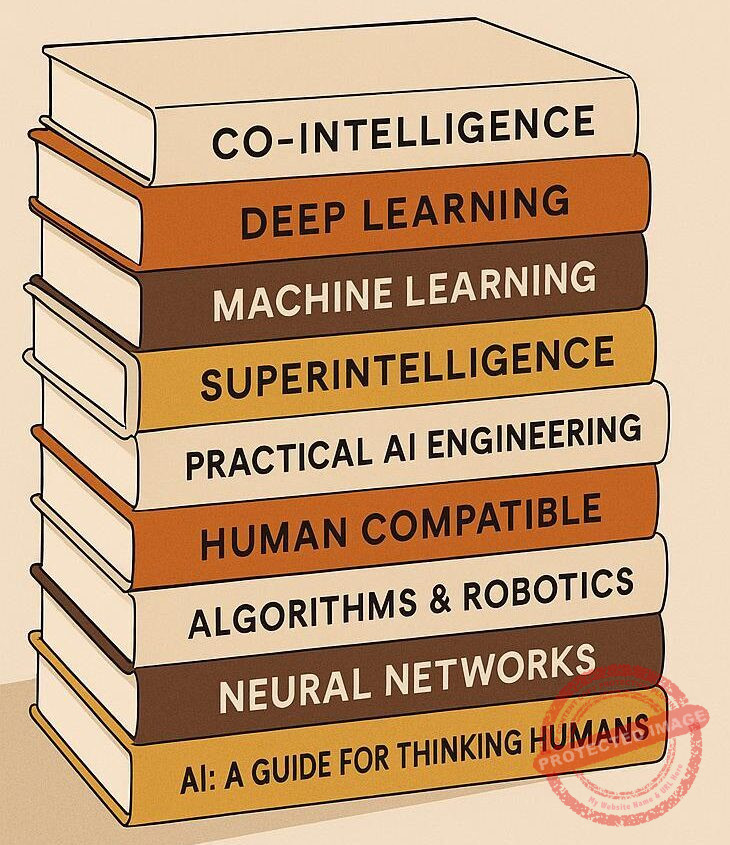Intro — why this list
AI is everywhere: products, research, workplace tools and headline-grabbing chatbots. But books still give the best long-form explanation — context, trade-offs, and the careful thinking that short articles miss. Below is a compact, practical list covering four needs: Understand the basics, learn the tech, explore ethics & futures, and read the human stories behind AI.
The shortlist — quick picks (with why you should read them)
1. Artificial Intelligence: A Guide for Thinking Humans — Melanie Mitchell
A clear, skeptical, and readable tour of what modern AI can — and can’t — do. Great for non-technical readers who want a realistic view of capabilities vs. hype. Stanford HAI
2. Artificial Intelligence: A Modern Approach — Stuart Russell & Peter Norvig
The canonical textbook for AI fundamentals. If you want a rigorous grounding in algorithms, search, planning, knowledge representation, and classic ML topics, this is the reference. (Not light — but essential for serious learners.) Five Books
3. Superintelligence: Paths, Dangers, Strategies — Nick Bostrom
A thoughtful, often-cited book about long-term risks and the strategic questions around advanced AI. Useful for readers interested in existential risk, governance, and the big-picture debates. Amazon
4. Co-Intelligence — Ethan Mollick
A recent, practical take on working with AI as a collaborator (co-intelligence). Good for managers and knowledge workers who want frameworks for integrating AI into teams and workflows. Medium
5. The Worlds I See — Fei-Fei Li (memoir & reflection)
A readable memoir that connects the human story behind computer vision research with lessons about research, leadership, and responsible AI. Great for context and inspiration from a leading researcher. Medium
6. Hands-On Machine Learning with Scikit-Learn, Keras & TensorFlow — Aurélien Géron
A practical, project-focused book that takes you from basic ML to modern deep-learning workflows. Ideal for engineers and applied learners who want runnable code and end-to-end examples.
7. Deep Learning — Ian Goodfellow, Yoshua Bengio & Aaron Courville
A technical, foundational book on neural networks and deep learning theory. For readers who want mathematical depth and a researcher/engineer level understanding.
8. Prediction Machines — Ajay Agrawal, Joshua Gans & Avi Goldfarb
A concise business-friendly explanation of how prediction technologies (i.e., AI) change decision-making, pricing, and strategy. Good for product managers and executives.
9. Human Compatible — Stuart Russell
Russell’s accessible treatment of aligning AI systems with human values; a strong follow-up if you want to move from technical foundations to safety/ethics design.
10. Practical AI Engineering / MLOps (various up-to-date titles)
Books and short manuals on deploying, monitoring, and scaling models (MLOps) — essential for teams turning prototypes into reliable products. Look for recent 2023–2025 titles to capture the latest tools and practices.
A reading roadmap (pick your path)
-
Curious & non-technical: Start with Artificial Intelligence: A Guide for Thinking Humans, then read Prediction Machines.
-
Engineer / practitioner: Hands-On Machine Learning → Deep Learning → MLOps/practical texts.
-
Research / advanced theory: Artificial Intelligence: A Modern Approach → specialty texts (RL, probabilistic models, optimization).
-
Policy / ethics / leadership: Superintelligence, Human Compatible, plus recent essays and reports from research institutes.
-
Short on time: Read a memoir (Fei-Fei Li) and a practical manager’s book (Co-Intelligence) to get both human context and immediate tools.
How to use ExcelReads to read these books
-
Search ExcelReads for the title or author, filter by public domain / free where available, and open the embedded reader for instant reading.
-
For textbooks and recent commercial books, use ExcelReads to find legally available previews, summaries, and related open resources (papers, lecture notes).
-
Save a “AI Learning Path” shelf: add one non-technical title, one practical/engineering title, and one ethics/policy title — rotate as you finish.
Quick tips for getting the most from AI books
-
Mix formats: combine a technical book (theory + exercises) with a narrative or case-study book to keep momentum.
-
Do small projects: after a chapter, implement one small example from the book — it cements learning.
-
Join a reading club: discuss hard chapters with peers; practical examples and debates accelerate understanding.
-
Keep an eye on recency: in fast-moving areas (LLMs, MLOps), prefer books and resources published in the last 2 years for tooling and platforms.


[url=byfurniture.ry]Дизайнерская мебель премиум класса[/url] — это воплощение изысканного стиля и безукоризненного качества.
Инвестиции в премиум мебель оправданы, так как она может служить долгие годы.